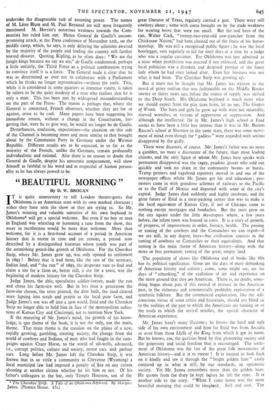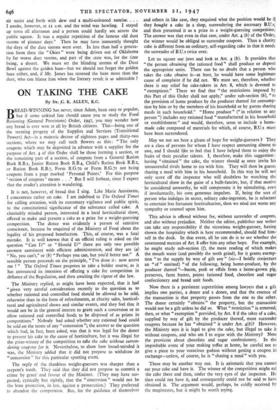" BEAUTIFUL MORNING "
By D. W. BROGAN Judge James, the able, speculative soldier-lawyer, made the run and chose his farm-site well. But in less than a generation the farm-site chosen, the trees planted, the dam built, the land cleared were lapsing into scrub and prairie as the local poor farm, and Judge James's son was off into a new world, Enid and the Cherokee Strip no longer able to hold him in face of the metropolitan seduc- tions of Kansas City and Cincinnati, not to mention New York.
If the maturing of Mr. James's mind, the growth of his know- ledge, is one theme of the book, it is not the only, not the main, theme. That main theme is the creation on the plains of a new, rapidly growing, gambling, creating society, the change from the world of cowboys and Indians, of men who had fought in the cam- paigns against Crazy Horse, to the world of oil-wells, advanced, i.e., corrupt politics, culture and society, motor cars and parlour cars. Long before Mr. James left the Cherokee Strip, it was known that in so virile a community as Cheyenne (Wyoming) a local municipal law had imposed a penalty of $ro on any citizen shooting at another citizen whether he hit him or not. Of his father's colleagues at the bar, only Temple Houston, son of the * The Cherokee Strip. A Tale of an Oklahoma Boyhood. By Marquis James. (Phoenix House. 15s.)
great liberator of Texas, regularly carried a gun. There were still cowboys about ; some with corns brought on by the trade weakness for wearing boots that were too small. But the real hero of the run, Walter Cock, "twenty-two-year-old cow-puncher from the Chickasaw Nation," had been cheated out of the fruits of his horse- manship. He was still a recognised public figure ; he was the local bootlegger, sent regularly to jail for sixty days at a time by a judge who was a regular customer. For Oklahoma was just admitted as a state when prohibition was enacted if not enforced, and the great local politician was a drunken and despised protégé of the fancy lady whom he had once looked after. Even her business was not what it had been. The Cherokee Strip was growing up.
But it must not be thought that Mr. James has written in the mood of gritty realism that was fashionable on the Middle Border twenty or thirty years ago, before the source of supply was shifted to the Deep South. His Oklahoma boyhood is much more what we should expect from the play than from, let us say, The Grapes of Wrath. The boys and girls he grew up with were not miserable, starved wretches, or victims of oppression or suppression. And although the intellectual life in Mr. James's high school at Enid seems to have been a little less intense than it was in Mr. Burton Rascoe's school at Shawnee in the same state, there was some move- ment of mind even though the " godless " were regarded with serious disapproval by the godly.
There were disasters, of course. Mr. James's father was no more a gambler, no more a discounter of the future, than most leading citizens, and the only figure of whom Mr. James here speaks with permanent disapproval was the cagey, prudent grocer who sold out quickly and took no share in the community booms or bursts. Tramp printers and vagabond reporters moved in and out of the newspaper offices where Mr. James got his real education ; pro- moters came in with grandiose schemes of railways to the Pacific or to the Gulf of Mexico and departed with some of the city's capital. Judge James died suddenly and highly insolvent, and the great future of Enid as a meat-packing centre that was to make it the local equivalent of Kansas City, if not of Chicago, came to nothing except mortgages and headaches. But the trees grew on the city square under the little skyscrapers where, a few years before, the infant town was housed in tents. It is a story of growth, of progress, of improvement in order, literacy, health. The passing or taming of the cowboys and the Comanches we can regret—if we are still, in any degree, boys—but civilisation consists in the taming of cowboys or Comanches or their equivalents. And that taming is the main theme of American history—along with the more or less permanent taming of the great, empty land.
The popularity of shows like Oklahoma and of books like this has its political significance. Gone are the days of mere debunking of American history and culture ; come, some might say, are the days of " rebunking," of the exaltation of art and experience on the mere ground that they are American. There is, no doubt, some- thing bogus about part of this revival of interest in the American past, in the elaborate and commercially profitable exploitation of a synthetic folklore. But the commercial exploitation, like the self- conscious virtue of some critics and historians, should not blind us to the realities of the past to which the Americans are turning or to the truth to which the revival testifies, the special character of American experience.
Mr. James hasn't many illusions ; he knows the hard and ugly side of his own environment and how far Enid was from Arcadia or even from those Idylls of the King from which it got its name. But he knows, too, the qualities bred by that pioneering society and the generosity and social freedom that it encouraged. The settle- ment of Oklahoma was the last of the great folk movements of American history—and it is so recent ! It is natural to look back on it kindly and see it through the " bright golden haze " easily conjured up in what is still, by our standards, an optimistic society. Yet Mr. James remembers more than the golden haze. He quotes from the diary he kept before he left the state. It is another side to the story. "When I came home was the most beautiful morning that could be imagined. Still and cool. The
air moist and fresh with dew and a multi-coloured sunrise. . . . I awoke, however, at ix a.m. and the wind was howling. I stayed up town all afternoon and a person could hardly see across the public square. It was a regular repetition of the famous old dust storms of pioneer days." Then he may have innocently thought the days of the dust storms were over. In less than half a genera- tion from then the " Okies " were being driven out of Oklahoma by far worse dust storms, and part of the state was, for the time being, a desert. We must set the blinding storms of the Dust Bowl against the golden haze—but we should not forget the golden haze either, and, if Mr. James has stressed the haze more than the dust, who can blame him when the literary result is so admirable ?



































 Previous page
Previous page